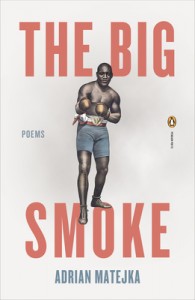The Big Smoke by Adrian Matejka
 The Big Smoke
The Big Smoke
by Adrian Matejka
Penguin Books, May 2013
128 pages / $18 Buy from Penguin or Amazon
Mixed martial arts matches often descend into tussles, yet boxing remains a splintered dance: when you are down, you are out. The stripped-down bodies of boxers moving on the lit ring-stage is ripe for literary fetish; even Joyce Carol Oates, whose God is the unsentimental moment, could not resist waxing about Mike Tyson. Although Leonard Gardner’s 1969 novel, Fat City, chronicles the emotional and physical destruction of impoverished fighters in Stockton, California, he could not resist corporeal iconography: “Padded and trussed, his face smeared with Vaseline, a rubber mouthpiece between his teeth, he stood waiting while two squat men punched and grappled in the ring.” Sinewy syntax to represent a body ready to burst.
The same mythos allows Adrian Matejka to channel Jack Johnson, the first black heavyweight champion. Matejka concedes that Johnson, in his own memoirs, was a “natural fabulist,” so fact matters less than emotion. But hasn’t it always in boxing? When Frank Bruno said he would knock Tyson onto Don King’s lap, no one believed him: except himself. The inches between boxers allow for miles of fantasy.
The same tendency toward fantasy makes many persona poems feel like projections of the poet rather than reconsiderations of the subject. Thankfully, Matejka resists pure fantasy and artifice; treatment of Jack Johnson is complicated and passionate. He appreciates his subject, much better than the analytical mode of much persona poetry, which makes the phantasmagoric act an exercise rather than an experience. From the start, his focus is on Johnson’s body: the tension between whether Johnson owns his own body enough to profit from it. It’s a smart take on the slavery that Johnson’s parents endured, and that he retains, in and out of the ring. In “Battle Royal,” the collection’s first poem, Johnson and other blacks fight for a single prize: “the last darky on his feet gets a meal.” Free enough to know what whites feared him, and to use that fright to complement his athleticism in the ring, but enslaved by a new system, where money creates identity, however tenuous.
This duality helps Matejka play on the concept of shadow boxing, with several dialogues between Johnson and his other self, one always chiding him for “Negro / caricature,” including his gold teeth. Those teeth are a light, a presence: power. From “Gold Smile”: “They call teeth dent in France, & the name / makes sense the way teeth do what they do / to bacon & shoulders & cakes. The French / word for gold is or, so when the folks in Paris / / describe my smile it sounds like what / happens when I punch a door: dents d’or.” The poem ends with Johnson’s taunt before the Tommy Burns fight: “the only reason I got gold uppers was to make / every bite of my food twice as expensive.”
August 23rd, 2013 / 11:00 am
